Meet Japan's First Western Geisha
She's got a Ph.D. from Oxford, but Fiona Graham spent a year learning how to pour tea. Oh, and she has to greet her senior geisha sisters on bended knee. In a Marie Claire exclusive, she describes how she became the only foreign geisha in town.SEE MORE PHOTOS HERE.
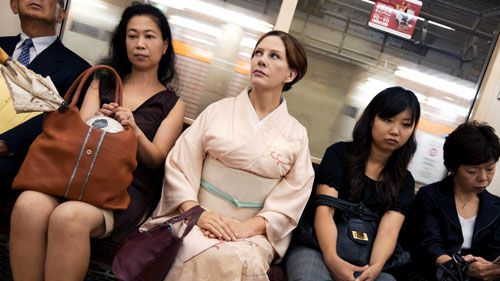
THE ELEGANT WOMAN in the pink silk kimono attracts admiring glances from be-suited businessmen and elderly Japanese women as she walks through the narrow, tourist-choked streets leading to Tokyo's Sensoji Temple. The locals here in the old district of Asakusa know a real geisha when they spot one — even if she is a tall Westerner with olive-green eyes. From her rounded bun hairstyle to her pigeon-toed tabi socks, Sayuki, otherwise known as anthropologist Fiona Graham, is decked out so immaculately in true geisha style that her admirers utter the same compliment as she passes by: kirei desu ne — she's beautiful.
Sayuki denies she's a flawless example of Japan's ancient flower and willow world. "Being a geisha takes a lifetime to perfect," she deflects, as she clacks along in lacquer sandals that she wears slightly too small to make her size-8 feet look more petite. Sayuki, who was born in Melbourne, Australia, became the first foreign woman in the notoriously closed profession's 400-year history to formally debut as a geisha two years ago, in late 2007. "I've only just begun," she says. "To many of my geisha sisters, I'm still a walking disaster."
It's all relative. Near Sensoji's majestic red gateway, gaggles of female Japanese tourists are clad in flowery kimonos — a new retro fashion trend. Sacrilegiously, they've added lace and frills to the fabric and wear garish costume jewelry. "Also, they don't wear underwear. The geisha elders are scandalized," laughs Sayuki, with only a faint Aussie twang in her girlish voice. "I'm wearing four layers of lingerie under my kimono, so at least I've got that right." Flaunting womanly curves is considered vulgar in the refined geisha realm; the layered undergarments, resembling silk bandages, ensure a tubular, demure silhouette.
"Geisha are full-time working artists, not sex objects," says Sayuki, apparently eager to dispel the popular myth that geisha are prostitutes or subservient, glorified waitresses. As highly skilled practitioners of traditional Japanese music and dance, she says, their role is to provide classical entertainment to rich and powerful Japanese men. The profession originated in the 17th century in response to male demand for cultured female company. According to Confucian custom, most marriages were loveless affairs arranged purely to produce heirs. While licensed courtesans existed to meet men's sexual needs, geisha carved out a separate niche as artists and erudite female companions. Their clients today include politicians, businessmen, and celebrities, who each pay an average of $400 per hour to attend private banquets and relax in an atmosphere of nostalgic beauty. "An experienced geisha can converse knowledgeably on any subject of interest to her clients, from international trade relations to domestic political intrigue, and she'll never reveal what was said," says Sayuki.
-->
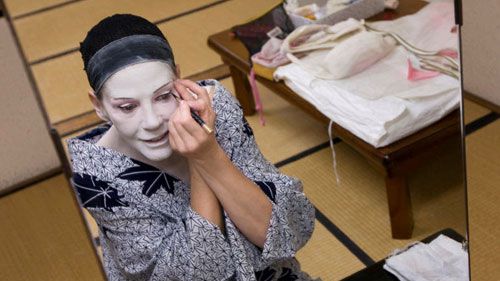
IT'S THE DAY BEFORE A LAVISH teahouse banquet that Sayuki — who rarely uses her Western name except on her passport and credit cards — is hosting for some of her clients. In the hot autumn sunshine, she's running errands at the tiny shops that serve Asakusa's geisha community by selling everything from ornate paper fans to dainty drawstring bags. There are 45 working geisha in this Tokyo district and an estimated 2000 throughout Japan. Their ranks have shrunk dramatically from 80,000 in the 1920s heyday, but they're far from a dying breed. "Modern geisha are strong, resilient businesswomen," insists Sayuki.
So how did this tawny-haired foreigner gain access to possibly the world's most secretive profession? Geisha customs are so arcane, Sayuki says, that even Japanese women are told to imagine they're "entering an alien country" when they start training. "I spent almost 10 years in Japan from age 15, first as an exchange student, then attending a Japanese university," says Sayuki, who is fluent in the local language. Later, she specialized in Japanese culture while completing her doctorate in anthropology at Oxford University. Without this grounding, becoming a geisha would have been impossible. "I get many e-mails from American women who want to be geisha. I explain that it's like trying to be a Japanese politician — nobody could arrive in Japan and become a politician overnight," she says. "You need advanced verbal and social skills."
Stay In The Know
Get exclusive access to fashion and beauty trends, hot-off-the-press celebrity news, and more.
American author and anthropologist Liza Dalby, the leading Western authority on geisha culture, agrees. "For Japanese, geisha are a repository of essential Japanese-ness. A foreigner in this role is almost a contradiction in terms," she says. Sayuki is the exception to the rule, and she has become so immersed in her geisha persona that she loathes discussing the fact that she's a gaijin — literally, "an outside person." Says Sayuki, "My Western background is irrelevant in my daily working life. I have to adhere strictly to the rules and customs just like everyone else." For instance, as the second most junior geisha in Asakusa — in terms of when she made her debut rather than her age, which no geisha reveals (although she looks to be in her mid-30s) — Sayuki must greet each of her 44 geisha sisters in order of seniority when they hold a meeting, and do so on her knees. "If I get the order wrong," she says, "I am severely reprimanded."
Most geisha wannabes yearn to join the profession because of its legendary beauty and mystique. Sayuki's initial reason was indignation. "It started as a project to make a documentary film, not long after the movie Memoirs of a Geisha was released," she says. She felt that the movie, based on Arthur Golden's novel of the same name, was an over-the-top fictional portrayal that misrepresented the refined geisha realm. "The book is a racy airport read, and many things in the movie weren't authentic," she says.
Her greatest objection was that Memoirs revolved so much around sex. "It's the white male fantasy," she says. "The geisha world is not all about sex; that's ludicrous." Sayuki admits that geisha do have a sexual allure, but claims it stems from their fabled unavailability — the fact they use their art, not their bodies, to survive. The famous Kyoto geisha on whom Memoirs was loosely based, Mineko Iwasaki, felt the same way. Iwasaki sued Golden over the book's story line that she sold her virginity to the highest bidder. The case was settled out of court.
STILL, A QUESTION about the role of sex arose in the 19th century, when it became common for top geisha to have a rich male patron known as a danna. Often a married client, the man paid for his favorite geisha's kimonos, wigs, and other expenses. In return, after a long courtship, the geisha would often agree to become the man's mistress. Male patrons still exist today, says Sayuki, adding that she doesn't have a danna herself. "Even if I did, there'd be no obligation to sleep with him," she says. "Geisha do get romantically involved with clients, but it's a private matter, just like romances that start in any other workplace."
Galvanized to render an accurate portrait of modern-day geisha, Sayuki held six months of meetings with local officials in Asakusa. Seniority is so respected within the geisha community that once she had the backing of a powerful geisha "mother" (geisha mothers are older women, usually retired geisha, who run their own okiya, or geisha houses, to supervise new recruits), nobody spoke out against the unprecedented acceptance of a foreign trainee.
Sayuki's geisha mother, Yukiko, a statuesque former geisha in her 60s, agreed to back her because she was impressed by Sayuki's mastery of the Japanese language and her determination to put herself through the rigorous training. Still, Sayuki had no idea how it would take over her existence, noting, "It occupied every moment of my waking life." Trainee geisha in their teens undergo four- or five-year apprenticeships, but women who join after the age of 20 are expected to learn the basics in just 12 months. Yukiko gave her the name Sayuki, meaning "transparent happiness," and corrected her every move for the next year. Sayuki's schedule was an exhausting round of studying tea ceremony and kimono-wearing, and mastering her chosen instrument, the bamboo flute. "The teachers don't believe in modern inventions like the photocopier," she says. "They don't give you written music; you have to learn complex ancient tunes by ear."
She was also required to work as a maid at teahouse banquets, to watch how qualified geisha charm Tokyo's male power brokers. "The hardest thing was learning to sit on my legs in the kneeling seiza position for hours holding heavy trays of food," Sayuki says. "It was agonizing." An older geisha told her that losing a few pounds could help to ease the pain, advice she rapidly followed.
-->
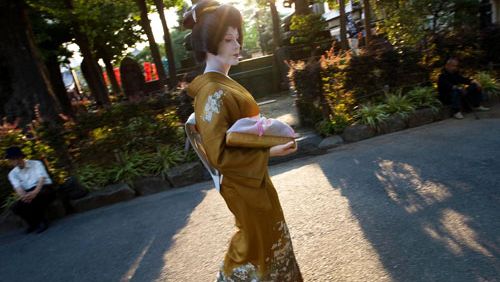
Sayuki's geisha mother told her she passed muster just three weeks before her training was due to end. "I felt overwhelming relief," Sayuki says. Yukiko lent her an exquisite powder-blue kimono and an obi, or sash, worth a total of $20,000, and then Sayuki traveled around the geisha district by rickshaw to formally introduce herself to teahouse owners, shopkeepers, and geisha colleagues. A debut is a private geisha ritual, so Sayuki's parents and sister back in Melbourne were not invited. "But of course, they were very proud," she says.
It's the afternoon of her big banquet, and Sayuki is getting ready at the local Geisha Association office, a modern building behind Sensoji Temple where geisha business is coordinated. In a sparse back room with tatami-mat flooring, she transforms her more natural daytime geisha appearance into the full-blown banquet look, with thick white rice-powder paint over her face and neck, black eyeliner, ruby-red lips, and a black wig — a look that replicates Japan's original 17th-century fashions. The final touch is black-colored contact lenses "to match the wig," she says. She's lucky, she adds, that her other Western features are not prominent. At 5'6", she's not the tallest geisha in her district, but her long arms mean the sleeves of her hand-painted silk kimonos must be painstakingly lengthened. Tonight she's wearing a light-green kimono with a cream obi. The transformation is stunning. With the mask of makeup and old-style wig, her appearance finally matches the way she sees herself: as a geisha first, and a foreigner second.
ON THE WAY to the banquet, Sayuki's rickshaw passes a bar where several businessmen are sitting outside. Thrilled to catch a glimpse of a real geisha, they ask her to stop and chat. Sayuki is in a hurry, but leans over to hand out calling cards bearing the address of her website, sayuki.net. Today, many savvy geisha have their own personal websites to attract new clients. Geisha work on an independent, freelance basis after they debut and can earn up to $20,000 per month, or eight times the average female office worker's salary of $2,500 per month. Sayuki won't say what she earns, but the fact that she owns 20 kimonos costing around $5,000 each is a clue to her success.
The Ichimatsu Teahouse, the banquet's venue, is an exquisite old building with a carp pond in the garden. Sayuki's 17 clients this evening are a group of businessmen and academics, and a handful of career women. There's an atmosphere of festive anticipation as everyone sits at low tables and the sake begins to flow. There's no doubt that the clients tonight are keen to clap eyes on the country's only Western geisha. "I'm nervous and excited to meet a non-Japanese geisha," says one man. The verdict? "She's cute. She has big eyes, and she wears kimono well."
As Sayuki's clients enjoy their 12 courses of Japanese delicacies, she plays her flute, and two of her geisha sisters, Azuha and Kazumi, perform traditional dances. It's the first time Sayuki has worked with Kazumi, and she's relieved it's going well. "Kazumi is very stern, and she has often criticized me," says Sayuki. "It took a while for me to realize that she was being generous by pointing out my faults."
Sayuki insists there is little female jealousy in her district, but then, she could hardly admit otherwise, given her junior status. She adds that she plans to remain a geisha indefinitely so she can be at the forefront of a revitalized industry; after years of so-called internationalization, Japan's hottest trend now is a return to traditional culture. "In the 1920s, geisha were pinup girls, and they appeared in fashion shows and ads for things like Shiseido cosmetics. That kind of popularity is returning, and I want to be part of it," she says.
As for her personal life, the most she will reveal is that she enjoys hiking and chocolate and is currently single. It comes as no surprise when she finally discloses that she's been too busy as a geisha to do much else. But sometimes, she admits, she likes to slip back into Western clothes for a brief spell of anonymity. While walking through Asakusa looking like a tourist, friendly Japanese occasionally stop her to point out an exotic passing geisha. "I just smile and look excited," she says, "and keep my life as Sayuki to myself."
-
 James Middleton Shares Why He Was "Breathless and Flustered" During Meeting With Queen Elizabeth
James Middleton Shares Why He Was "Breathless and Flustered" During Meeting With Queen Elizabeth"I heard a snort of laughter and looked past the Queen to see everyone in the room stifling their giggles."
By Kristin Contino
-
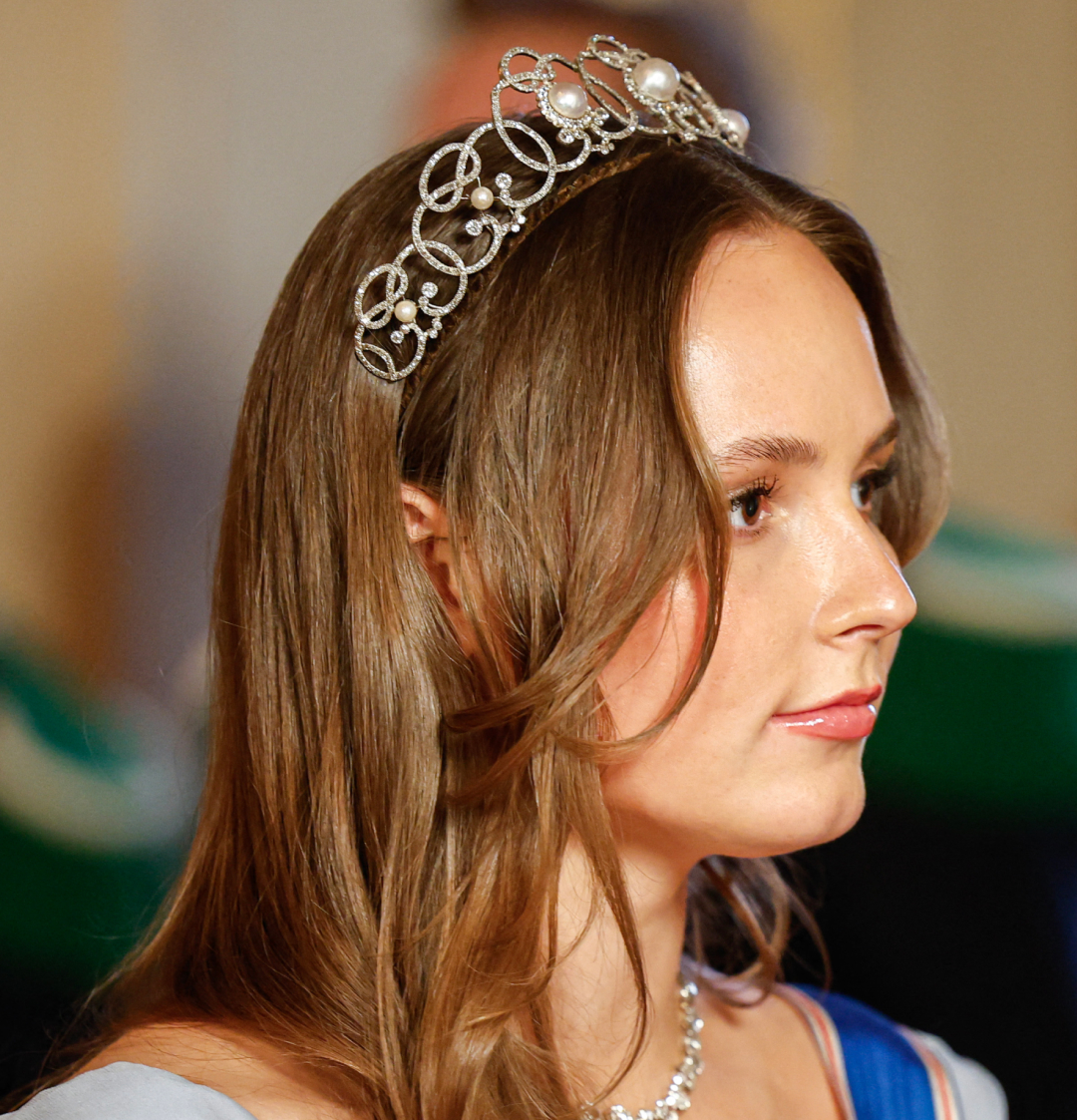 This Modern Princess Will Break a 600-Year-Old Tradition When She Takes the Throne
This Modern Princess Will Break a 600-Year-Old Tradition When She Takes the ThronePrincess Ingrid Alexandra of Norway will follow in a long-ago ruler's footsteps.
By Kristin Contino
-
 Hailey Bieber's "Favorite Jacket" Is Actually One She Designed
Hailey Bieber's "Favorite Jacket" Is Actually One She DesignedIt's a piece for husband Justin Bieber's new brand.
By Halie LeSavage
-
 The 100 Best Movies of All Time: The Ultimate Must-Watch Films
The 100 Best Movies of All Time: The Ultimate Must-Watch FilmsWe consider these essential viewing.
By Quinci LeGardye
-
 The Best Bollywood Movies of 2023 (So Far)
The Best Bollywood Movies of 2023 (So Far)Including one that just might fill the Riverdale-shaped hole in your heart.
By Andrea Park
-
 ‘Bachelor in Paradise’ 2023: Everything We Know
‘Bachelor in Paradise’ 2023: Everything We KnowCue up Mike Reno and Ann Wilson’s \201cAlmost Paradise."
By Andrea Park
-
 Who Is Gerry Turner, the ‘Golden Bachelor’?
Who Is Gerry Turner, the ‘Golden Bachelor’?The Indiana native is the first senior citizen to join Bachelor Nation.
By Andrea Park
-
 The 50 Best Movie Musicals of All Time
The 50 Best Movie Musicals of All TimeAll the dance numbers! All the show tunes!
By Amanda Mitchell
-
 'Ginny & Georgia' Season 2: Everything We Know
'Ginny & Georgia' Season 2: Everything We KnowNetflix owes us answers after that ending.
By Zoe Guy
-
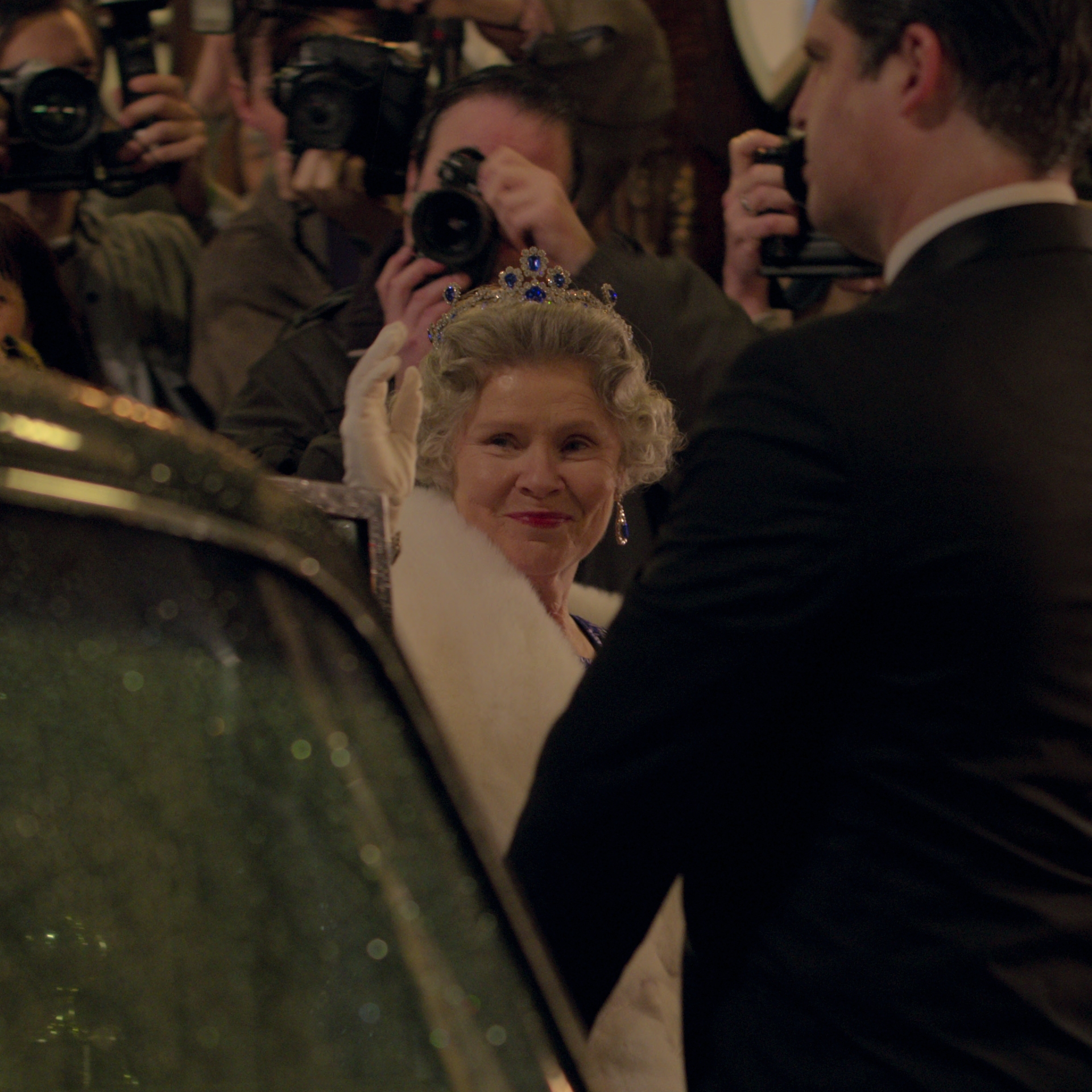 The Cast of 'The Crown' Season 5: Your Guide
The Cast of 'The Crown' Season 5: Your GuideFeatures The Mountbatten-Windsors have been recast—again.
By Andrea Park
-
 Who Is Hasnat Khan, Princess Diana’s Boyfriend on Season 5 of ‘The Crown’?
Who Is Hasnat Khan, Princess Diana’s Boyfriend on Season 5 of ‘The Crown’?Features Di’s friends have said she referred to the doctor as \201cthe love of her life.\201d
By Andrea Park